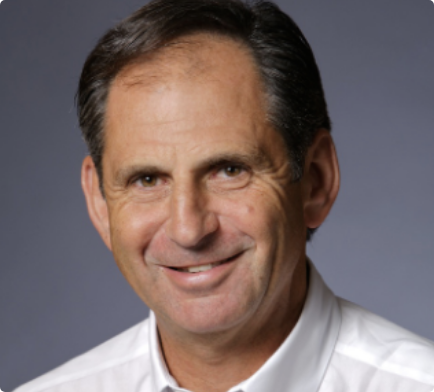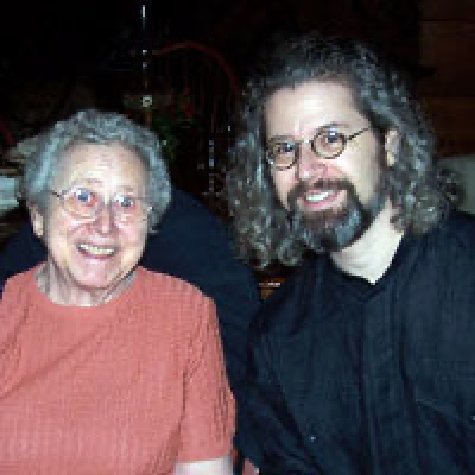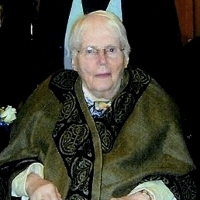Philanthropy is the engine that powers the Reeve Foundation forward. Thanks to the generosity of individuals and families, we are moving closer to delivering on our mission – enhancing quality of life for all people living with paralysis and finding cures for spinal cord injury in the here-and-now.
Here we pay tribute to some of our esteemed donors by telling their stories. We sincerely thank them for so generously including us in their monthly and estate planning, thereby having an immediate impact far beyond their own lifetimes.
Give monthly Join our planned giving societyJohn McConnell is the Vice Chairman of the Reeve Foundation Board of Directors. You can’t tell by looking at him, but John experienced a severe spinal cord injury after a bike accident. He recovered, but the close call ignited a passion and purpose to join ranks with the Reeve Foundation.
Over the years, John has invested his time and money from working with donors to running the NYC Marathon alongside Matthew Reeve. John has also made plans to leave part of his estate to the Reeve Foundation.

My estate gift is through my life insurance, which is perhaps the most simple way to approach this. You aren’t taking away from those you care about because often those funds are not typically available to anyone while you are alive.
It can be a tough thing to talk about, death, but I’ve gotten close to it a few times. It’s part of the deal. But people often wait too long or until the very end to deal with this issue. I find it liberating to deal with it now so in the event something was to happen, it would not burden my family.
Estate planning or making a will doesn’t have to be a complicated process. You hire professionals to do it. You know what your numbers are. I know what my children and my family need, and I know what others need. That’s a part of it.
If you are in a fairly good place, there is room to extend your giving for many years down the road. Whether or not you’re able to provide on an annual basis, hopefully you can provide at the end.
I feel that we have a responsibility when we are able to take care of ourselves, which most of us are, to give back and to pay forward.
Ask yourself, how do you want to live your life? I know how I want to live mine. I want to be kind to people. I hope the world is better off because of my contribution. Since I have the opportunity, I will leave behind resources to help push ahead on issues that are important to me.
– John McConnell

Rick Coker was a very generous man. He helped many people during his lifetime, and it was no surprise that he had planned a generous legacy to a cause that became very close to his family and their hearts.
The story of Rick and Betty Coker’s gift to the Reeve Foundation began in 1991 when Richard set out to create two charitable trusts.
Betty said, “To be honest, at first Richard was basically just looking for a tax deduction, and didn’t really know much about the Reeve Foundation. It wasn’t until our niece was injured in a car accident leaving her quadriplegic that Richard really started doing some homework.”
Compelled by their niece’s accident, Rick and Betty’s search for information brought more and more startling, and at times, devastating, facts about spinal cord injury to their attention.
Betty recalled, “We found that it was mostly young people who were afflicted – a lot of times people who have their whole lives ahead of them. It was just mind boggling that so many young people are paralyzed.”
Rick and Betty’s “beautiful and athletic” niece was no exception. She was only in her twenties when she sustained a spinal cord injury. Unfortunately, she eventually lost her life to an infection, a chronic issue for many with paralysis. The family was heartsick.
Rick and Betty, at that time in particular, were inspired by Christopher Reeve’s persistence, his willingness to try everything he could, “It was very uplifting to see what [Chris] was doing with his life.”
Rick and Betty became donors of the Christopher & Dana Reeve Foundation because they realized that unlike the very large, high profile charities, spinal cord injury does not receive enough support and attention proportionate to the number of people it affects.
“Until something happens in your own life, until you see that an injury to a small section of the spinal cord – that’s all it takes – can completely shut down someone’s entire body – people just don’t think about these things.
Yet it has an enormous impact on all of society, because a great number of spinal cord injured people are young and will have to deal with paralysis and its many secondary complications – infections, depression, unemployment – for many, many, years, sometimes for decades. And it’s not just the injured person, it’s the whole family. The financial and emotional costs are immense.”
– Betty Coker
Both Rick and Betty understood that there was enormous potential, through their planned giving, to provide help and hope to so many others.
Over the years, Rick and Betty had many conversations about their charitable gifts and intentions. In fact, just before undergoing a somewhat risky surgical procedure, Rick brought the subject up with Betty again, and decided he wanted to increase the amount of their gift.
We lost a committed and valued friend when Rick passed away in 2003. But through his planned gift to the Reeve Foundation, Rick’s legacy will continue to make a real difference to others for many years to come.
His generosity defined him, and Betty sees Rick’s charitable trust as a logical extension of his charity in life – “If he continued to live, he would have done a great deal more.”
Gladys Field – pictured here with her son, Richard – was a homemaker her entire life but took over the family finances when her husband Norman died in 1991.
She had worked as a mathematician during World War II and seemed to have a knack for investments. Before she died in 2009 at the age of 88, Gladys made arrangements to leave several legacy investments
“My mother was a very bright woman,” said Richard Field, one of four children. “When she became a widow she really took the reins with regard to the family’s finances. She kept the family house until she had a stroke and then moved to an assisted living facility.”

Gladys had managed her resources well. She made plans before her death to invest in several charities. “She looked long and hard at how to best disburse her funds,” says Richard.
While the Field family had no direct connection to spinal cord injury or to Christopher Reeve, Gladys set up a charitable annuity trust to make an annual gift to the Reeve Foundation for 10 years.
“My family was always drawn toward science and toward medical research and health,” Richard recalled, who is executor of Gladys’s charitable trust. “She was very careful to pick an organization to fund, one that was the most productive, most exciting, and most useful. She liked the fact that the Reeve Foundation was working toward medical cures, but also that the organization addressed the care side too.”
Richard said that when his mother made up her mind, she was living in an assisted care facility, and appreciated how quality of life was directly affected by care.
The Field family established an annual science speakers program in New Jersey named for Norman, who was a physicist and educator.
“We as a family are all very pleased my mother was able to make a contribution to the Reeve Foundation. We see good things there and trust the money will be used wisely. We hope to stay involved in Reeve Foundation activities.”

Evelyn Costello Marineau Lamont’s bequest to the Reeve Foundation came as no surprise to her family – living the last 17 years of her life in a wheelchair after a car accident.
Evelyn followed Christopher’s story closely. She was inspired by his persistent search for a cure, the stand he took for those impacted by a spinal cord injury, and his selfless devotion to helping those similarly situated.
Evelyn was a veteran volunteer with the Marinette, Wisconsin County Elderly Services for 17 years, was on the board at her local Salvation Army, volunteered with Easter Seals Heart and Cancer Associations, and facilitated stroke and Alzheimer support groups.
Those close to Evelyn marveled at her positive, uplifting attitude. She believed that while her own accident was unfortunate, her life was still a blessing.
Evelyn never made her disability an issue and relentlessly focused on others she could help. For instance, after discovering she received significant physical relief from water therapy at her local YMCA, Evelyn made sure the pool became wheelchair accessible so all seeking relief could find what she found.
When Evelyn spoke to her family about leaving a bequest to the Reeve Foundation, it was clear she understood how important every donation is in in the future for a cure. “One day these kids will be able to walk; it won’t happen in my lifetime, but you never know.”
When Bill Day retired from a long career in computer programming at Lexmark, he generously updated his will to include the Reeve Foundation in his estate plans.
Having sustained a spinal cord injury 22 years ago after falling from a roof, Bill remained active in family and business affairs and has been recognized for his community service.

Bill was attracted to the Reeve Foundation many years ago, following his accident. Its mission was his mission. After years of making annual gifts through the Reeve Foundation’s direct mail program, he wanted to do more. He and his wife have grown children and a six-year-old grandson who is the light of their lives.
“We’re in good shape for our retirement,” Bill said, “and I have always considered myself fortunate. I want to give back, not only now but also beyond my lifetime.”
What made Robert Heim exceptional was not his immediate triumph over adversity, but rather his ‘everyman’ struggle. At first overwhelmed by the accident from which he was living with quadriplegia, Heim then moved to acceptance, and then finally aspired to make a difference. Heim‘s story is indeed a story about a change of heart.
Heim served 22 years in the United States Navy as a Commander and received many awards. After retirement in 1990, he worked as a consultant with the National Security Agency until a motorcycle accident in 2000.
After struggling for years with the accident that changed his life, Heim called his brother, Thomas. Heim said that he’d had a change of heart and that he was finally able to focus on all the good things in his life rather than on the accident that changed it.
Subtle differences became apparent in the way Heim took an interest in the lives of others and in the way he began to view his circumstances, considering himself blessed. It was this mentality that carried Heim through the last six years of his life, constantly acknowledging all the good he had, all the ways he was blessed, and sharing the good fortune he enjoyed with those in need.
This positive attitude motivated Heim to think of how he would be able to help make a difference. It was in this generous spirit that he included a bequest to the Reeve Foundation in his estate plans. Heim passed away too young and too soon in 2010. Yet, his legacy to the Reeve Foundation was a symbol of this triumph; a symbol of how, ultimately, Heim found peace and acceptance after a change of heart.
A self-professed ‘exercise addict’, Karen Cook has spent most of her life on the move.
“I love to run, swim, dance, you name it,” said Cook, who was an elementary school teacher in Columbus, Ohio, for 25 years. “I also loved to be active with my students. I would write plays that used creative props and movement. I never slowed down.”
Karen is equally passionate about travel. But as she gets older, she has become more limited in her abilities. “I can’t do things like I used to. All that activity wore out my body,” she shared.
In 2007, Karen had back surgery to repair badly torn disks. After several years of relief, she now has multiple back problems and a high appreciation for the challenges that come with physical limitations.
“I really connected with Christopher Reeve’s story after his accident Being very active myself, I felt a strong lifestyle connection to him. It is such a challenge when a body isn’t working correctly.”
As her travel and other activities slowed, Karen decided to use her savings to create a charitable trust and donate any unused balance to help support causes that are important to her, including the Reeve Foundation.
Karen shared: “I admire Christopher Reeve’s spirit and the vital work the Reeve Foundation is doing. With all the money poured into technology advances these days, I think more resources should go to helping people get out of wheelchairs. I hope that, one day, the resources from my estate can help.”
Tristam Johnson was a young teen when his father married Christopher Reeve’s mother, Barbara.
“I remember spending summer vacations together and lots of football and baseball games,” said Tristam. “Even as a young kid, Chris had wonderful values and ethics. He lived with honesty and integrity.”
Over the years, the family remained connected and enjoyed warm celebrations for holidays and birthdays.
“As his acting career took off, Chris became very successful but not polluted as can often happen,” says Tristam. “He was always adaptable, enjoyable, intelligent, and kind. After the accident, his approach, style, eloquence, and conviction never wavered. In spite of his incapacity, he was fully capable.”
In honor of his step-brother, Tristam donates to the Reeve Foundation monthly as part of the Heroes for Hope program.
“Monthly giving offers the Foundation a reliable flow of resources that can make a big difference. Consistent support allows the Foundation to continually move forward and think strategically for the long term.”
Like Tristam, Christopher’s mother, other siblings and family members also give generously of their time and support to the Reeve Foundation. In 2013, Christopher’s father, F.D. Reeve, passed away, and the Reeve Foundation was named to receive tribute gifts in his memory.
“We give as a tribute to Chris’ endless passion and commitment to research, solutions and hope. He made a global impact, and there is no way to say ‘thank you’ to someone like that. We all feel attached to Chris and grateful for all he has done to help others.”
When Mike Yeisley’s father, Jim, fractured his neck in a 1987 car accident, his family found few resources and little support.
“Our initial doctor misdiagnosed the damage and said my father would die,” said Mike. After a transfer to Houston Methodist Hospital, x-rays revealed a C5 fracture.
“Our experience was a nightmare. It was so hard to get what we needed. Just trying to get a hand pedaler cost a fortune; now all that stuff is so available.”
Jim lived for 12 years after his accident and passed away on Christmas Day 1999. Mike is grateful that people living with spinal cord injury today have access to so many more resources.
“It is light years ahead how far things have come for people living with spinal cord injury in the last 20 years. It is amazing to see how much has changed, and how much good work the Reeve Foundation has done.”
Mike first learned about the Reeve Foundation after he read Christopher Reeve’s book. He donated off and on for several years. Then, last year, he decided to become a Hero for Hope through monthly giving.
As I get older, helping others becomes more important. And it is nice for the Reeve Foundation to have a regular stream of resources they know they can rely on.
“It is so exciting to see some of the things the Foundation is doing, like the epidural stimulation research and Quality of Life Grants. These programs, and many others, are so important to helping people with spinal cord injury feel like a human being again.
– Mike Yeisley
Bob and Jessica Robertson first became aware of the Reeve Foundation after Jessica sustained a spinal cord injury from an accidental fall in 2007.
“I got up to get water in the middle of the night and fainted,” said Jessica, who is paralyzed from the mid-chest down and was treated at the Frazier Rehab Institute in Louisville, KY, one of the Reeve Foundation’s NeuroRecovery Network centers. “I have been amazed at what the Reeve Foundation can do and will continue to do in the future.”
Several years ago, the Robertsons learned about the matching gift program offered by The Westervelt Company, a privately-owned natural resource company headquartered in Tuscaloosa, AL, in which Bob’s family owns stock.
“Westervelt offers shareholders a $14 match for every $1 donation up to a determined cap,” Bob shared, whose grandfather was given the stock many years ago as an executive with the company. “Our family only has a small percentage of stock but with such a generous program, the money really adds up.”
Ray Robbins, Vice President, Secretary & General Counsel at The Westervelt Company, says that many of the company’s shareholders take advantage of the matching program. “The company is proud to help support the charities that are near and dear to our shareholders’ hearts.”
The Robertsons strongly encourage others to find out about their companies matching gift programs. “There are many other companies that match shareholders’ contributions. By sending a donation for the matching funds, you can have a say in where your company’s charitable giving goes.”
Each of our planned giving donors, leaving legacies through diverse giving vehicles, has been welcomed as a member of the Reeve Foundation’s Michael A. Hughes Planned Giving Society, an esteemed circle of supporters who have made generous commitments to include the Reeve Foundation in their estate plans. Learn more about planned giving.
You can also contribute to the Reeve Foundation becoming a monthly donor – with the knowledge that your donations will help secure valuable assistance and research for years to come.